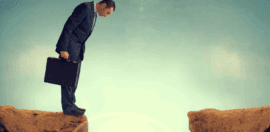The power of the volunteer workforce

Mark Pearce
24 May 2021 at 4:33 pm
As the CEO of Volunteering Australia, Mark Pearce is on a mission to highlight the work of volunteers in the country, and see the sector flourish. He’s this week’s Changemaker.
Anyone that has anything to do with the social change space will know just how important the volunteer workforce is.
Volunteers are integral to keeping organisation’s afloat, helping vulnerable people during times of disaster, and enhancing the communities we live in.
It was during his tenure at National Congress of Australia’s First Peoples that Pearce developed an understanding of the importance of Australia’s volunteer workforce, and the value the activity provides to communities and volunteers themselves.
Post-COVID, the sector is facing a number of challenges. But it’s nothing Pearce isn’t ready to take on, focusing his efforts on reducing the barriers to entry for volunteering and strategically positioning it alongside the paid workforce.
In this week’s Changemaker, he discusses his vision for the sector, dealing with challenging moments, and the importance of strong local communities.
How did you get involved in Volunteering Australia and land in the CEO position?
I was working with the National Congress of Australia’s First Peoples at the time, and I set up a partnership accord with Volunteering Australia because volunteering touches upon so many Indigenous communities throughout the country.
When Volunteering Australia changed from a member-based board to a skills-based board, they asked me if I would be interested in joining, which I was. I sat on the board for about 18 months. Then Adrienne Picone, who was the CEO at the time, moved back to Tasmania and the board asked me to step in as the interim CEO. And it was really my intention that they would find a CEO and I would go back onto the board. But honestly, I loved it so much. I couldn’t believe just how much Volunteering Australia does and I was hooked. I put my hand up and thankfully, through a very rigorous process, I ended up being appointed CEO.
And what are you trying to achieve at the organisation?
So I think there are a number of things. I want to create a better understanding of what volunteering is, how it can be done, and what sort of impact it has on communities as well as the positive impacts it has for the volunteers themselves, at a federal government, corporate, philanthropic and community level. What comes from that is better engagement with volunteers, more volunteers, and volunteering being considered in a more holistic fashion. So not just as something that you do when you don’t have anything else to do, but as an intrinsic part of community life. And I think for us, and for me, my major focus is on improving the structures that sit around volunteering to enable it to be better. To reduce the barriers to entry for volunteering, and additionally to ensure that it is considered in a strategic fashion alongside the paid workforce.
What are some of the ways that you stay grounded in your job when you’re faced with challenges?
It starts with conversations I have with volunteers and their commitment to their communities. The one thing I tend to say a lot to people, and I truly believe this to be the case, is that the act of volunteering is a profound, aspirational statement around what we want the communities in which we live to be like. So that means they are caring and inclusive, good places to be, fun places to be. And we can do that through volunteering, it’s one of those opportunities where merely by putting up your hand and saying, “Hey, I’ll help”, you can fundamentally change the nature of the community in which you live. And Australia is just a collection of communities, and so it flows. And that’s the thing. More than anything else it’s about facilitating that, it’s about understanding that. That’s the thing that gets me through.
What’s a piece of advice you have for someone wanting to make a change in the world?
I think that the way you make change in the world is by looking around your community. Because it’s so easy for us to look at aggregate data and say, “these are the numbers for Australia, and this is the Australian experience”. But we know that we live our lives in community. And so if you want to change the world, change your community. It’s the most powerful and profound way of changing the world. The challenges and the opportunities that you see in communities are the challenges and opportunities that you’ll see globally, but you can make immediate change in a small but really powerful and meaningful way. And that’s what makes the difference globally.
When you’re not at Volunteering Australia, what do you like to do in your spare time?
So I sit on a number of boards and these are volunteer positions. So I’m also the deputy chair of Animals Australia. I have an abiding interest in animal welfare and that flows from a deeper belief in the need to reduce suffering where I can. That belief tends to influence the vast majority of things that I do with my spare time. It was the thing that got me involved in organisations like National Congress and then Volunteering Australia and with Animals Australia. I’m also doing a masters in public policy at the Australian National University, which is keeping me pretty busy.







